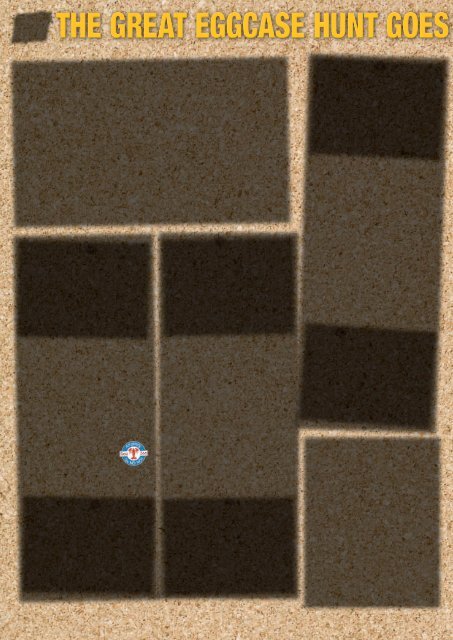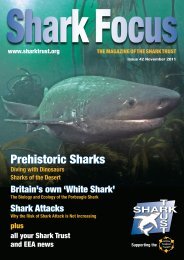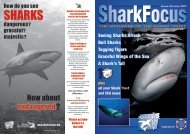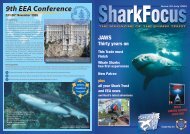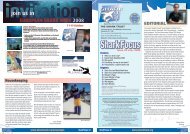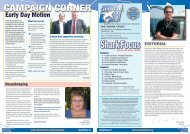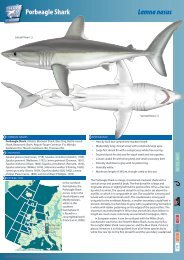Shark Focus
No Limits? - The Shark Trust
No Limits? - The Shark Trust
Create successful ePaper yourself
Turn your PDF publications into a flip-book with our unique Google optimized e-Paper software.
The Great Eggcase Hunt goes on tour!additional funding by:The Great Eggcase Hunt (GEH) was launched on Wembury Beachback in 2003; ten years on, the Trust returned to the same spotto engage a new generation of shark enthusiasts and beachcombersby kick-starting a series of events around the UK coastline. In total,six Great Eggcase Hunts took place this spring in a collaborationbetween The <strong>Shark</strong> Trust and The Co-operative Membership team,partnering with a local organisation at each location. Each eventvaried immensely in terms of attendance, activities and the number/species of eggcases found, while The Co-operative Membershipprovided access to a whole new audience of eggcase hunters.Remember that any trip to the beach can be an eggcase hunt and itdoesn’t need to be part of an organised Great Eggcase Hunt event!SubtitleCat with the Winsor family on Wembury Beach© sghaywood photographySouthwest event: Wembury Beach, DevonLocal Partners: Plymouth National Marine Aquarium# Eggcases Found: 10Species Found: Smallspotted Catshark, ThornbackRay, NursehoundNotes: This was the inaugural event for the GreatEggcase Hunt roadshow with The Co-operativeand it certainly didn’t disappoint! The interestingitems on display at the <strong>Shark</strong> Trust and NationalMarine Aquarium stands proved to be a big draw foreveryone, including beach goers who hadn’t registeredto join in with the Hunt,so the message was spreadfar and wide!Dylan with Smallspotted Catshark find on Wembury Beach© sghaywood photographyEggcase hunters at Lytham St Annes © The Co-operativeNorthwest: Lytham St Annes, LancashireLocal Partners: Blackpool Sealife Centre# Eggcases Found: 142Species Found: Thornback Ray, SmallspottedCatshark, Spotted RayNotes: Blackpool Sealife Centre was the settingfor the Northwest event, a coach took Co-operativeMembers down to Lytham St Annes beach andafter just a few hours, an incredible 142 eggcaseshad been found and reported! Hunters were theninvited to enjoy the aquarium for the remainder of theafternoon – everyone thoroughlyenjoyed the event and were keento take part again!Successful eggcase hunters at Lytham St Annes© The Co-operativeSpotted Ray find in Whitby © John Bates PhotographyNortheast: Whitby Beach, North YorkshireLocal Partners: CBBC’s Deadly Art presenterand sand sculptor Nicola Wood# Eggcases Found: 2Species Found: Spotted RayNotes: This was actually a great result for usas the Northeast coastline has been somewhatof a black-hole in terms of data submitted to theproject, so we’re never sure if people are not outhunting or if the eggcases are not there to be foundin the first place! CBBC’s Deadly Art presenterNicola Wood joined us to create an incredible sandPorbeagle, while attending members combed thebeach for eggcases before creating their own sandsculptures.Nicola Wood‘s sand Porbeagle. © John Bates PhotographyBirsay, Orkney GEH & Bag-the-Bruck team. © Tom O’BrienScotland: Birsay Beach, OrkneyLocal Partners: Environmental Concern Orkney(ECO) and Orkney Skate Trust.# Eggcases Found: 251Species Found: Flapper Skate, SmallspottedCatshark, Thornback RayNotes: ECO organise an annual Bag-the-Bruckwhich encourages Orcadians to clear their localbeaches, loch sides and ditches. This year the <strong>Shark</strong>Trust joined forces with ECO and the OrkneySkate Trust, and asked people to hunt for eggcaseswhile they collected bruck. This was a particularlyinteresting event as this area is one of the lastremaining strongholds for the Critically Endangeredand largest species of skate, the Flapper Skate. Thededicated eggcase hunters at this event found anincredible 246 eggcases from this species alone -difficult to explain that the species is under seriouspressure when you’re tripping over their eggcases!Eggcase hunting on Llandudno Beach © Kineta KelsallCreating art out of eggcases in Margate. © Phil WeedonWales: Llandudno Beach, North WalesLocal Partners: Anglesey Sea Zoo# Eggcases Found: 92Species Found: Smallspotted Catshark, ThornbackRay, Spotted Ray, NursehoundNotes: This idyllic seaside town was the setting forthe Welsh event, with staff from Anglesey Sea Zoojoining us for the Hunt. It was a slow start, but oncethe first few eggcases were found and hunters knewthe best spots to look at theback of the beach, there was nostopping them!Llandudno, North Wales © Kineta KelsallSoutheast: Margate Main Sands, KentLocal Partners: Thanet Coast Project# Eggcases Found: 49Species Found: Thornback Ray, SmallspottedCatshark, Spotted RayNotes: As well as the eggcases, a plethora of otherobjects were found along the strandline, includingIntroduction text.whelk eggs, cuttlefish eggs, cuttlefish bones, variousshells and even two Smallspotted Catsharks (whichproved useful to show the dermal denticles on sharkskin). Everyone was kept busy filling uptheir collection tubs before helping out theThanet Coast Project by creating somebeach art using their finds.Hunters with their beach art on Margate Main Sands© Phil WeedonThank you to all Co-operative Membershipgroups that helped to organise an eventand to all of the local partners that turnedup to support the Great Eggcase Hunt.A special thank you to all hunters thatcame along to comb their local beach,this project certainly wouldn’t be possiblewithout you! With over 35,000 eggcasessubmitted to date, this public recordingproject is still going strong, proving to beas popular as ever and even being namedas one of the “10 Best Hands-on WildlifeProjects” by Coast Magazine. With moreand more people engaging in the project,the <strong>Shark</strong> Trust is looking forward toreceiving more eggcase finds than ever!Common Skate ConundrumWe’ve previously reported that the Common Skate is now scientifically recognised as being two distinctspecies - the Flapper Skate and the Blue Skate - that had long been confused under the single scientificname Dipturus batis. The Flapper Skate (Dipturus cf. intermedia) is found primarily around the north andwest coast of Scotland and Ireland, the eggcases are very large at approximately 20cm in length (if fresh;older more desiccated eggcases won’t rehydrate as much and will be smaller). The Blue Skate (Dipturus cf.batis) is known to be present off the southwest coast of Ireland along the continental shelf; however theeggcases have not previously been identified, until now. In June the <strong>Shark</strong> Trust was excited to receivea batch of eggcases from the Centre for Environment, Fisheries and Aquaculture Science (Cefas), whichwere taken from adult Blue Skate. Although displaying some similarities, the eggcases of the Blue Skateare in fact much smaller than the Flapper Skate cases, at approximately 14cm in length. Skate lay pairedeggs, one from each oviduct, and having measured all of the ‘twin’ eggcases, the Trust found that themeasurements were almost identical, with just a few millimetres difference in each set. Findings of this workwill be published later in the year.Flapper Skate haulfrom Orkney.© The <strong>Shark</strong>TrustFlapper Skate Vs. Blue Skate eggcases © The <strong>Shark</strong> Trust16 www.eggcase.org <strong>Shark</strong> <strong>Focus</strong> 47 <strong>Shark</strong> <strong>Focus</strong> 47 www.eggcase.org 17


